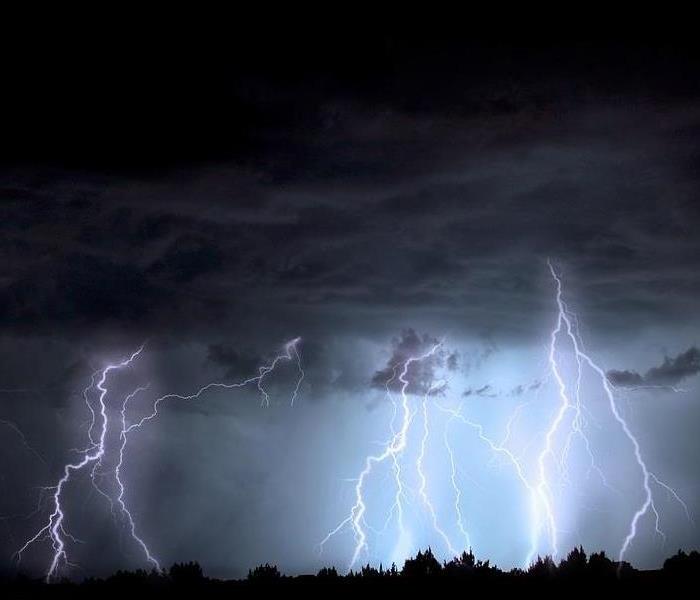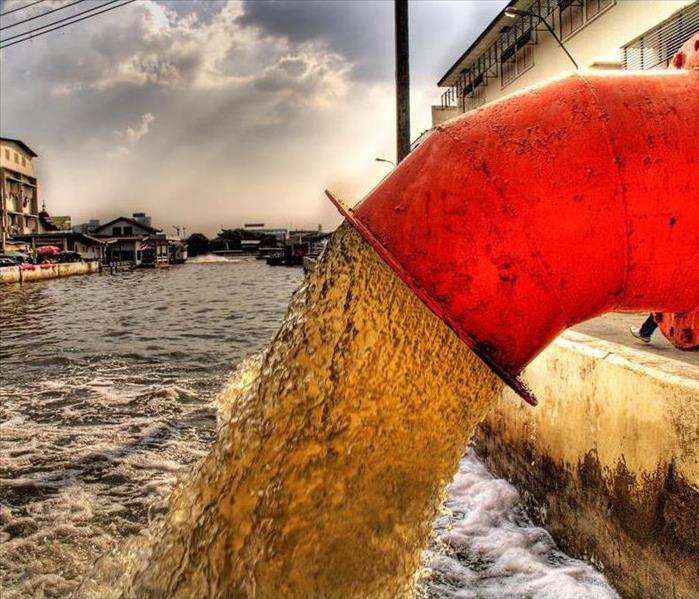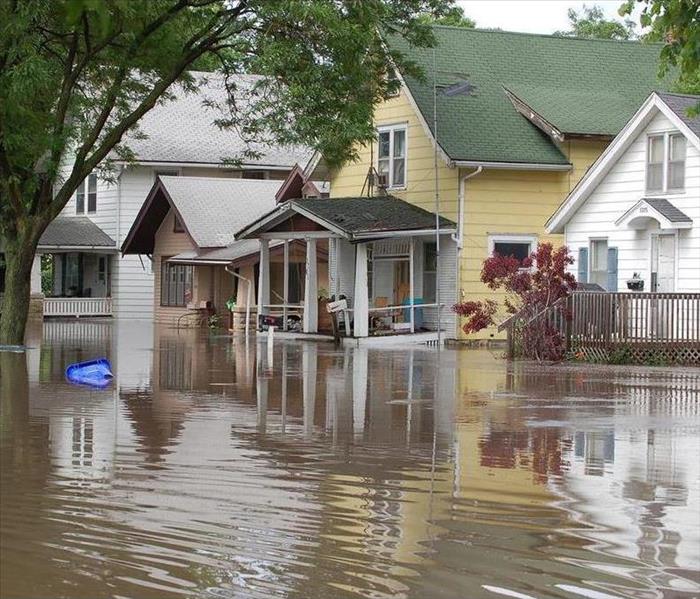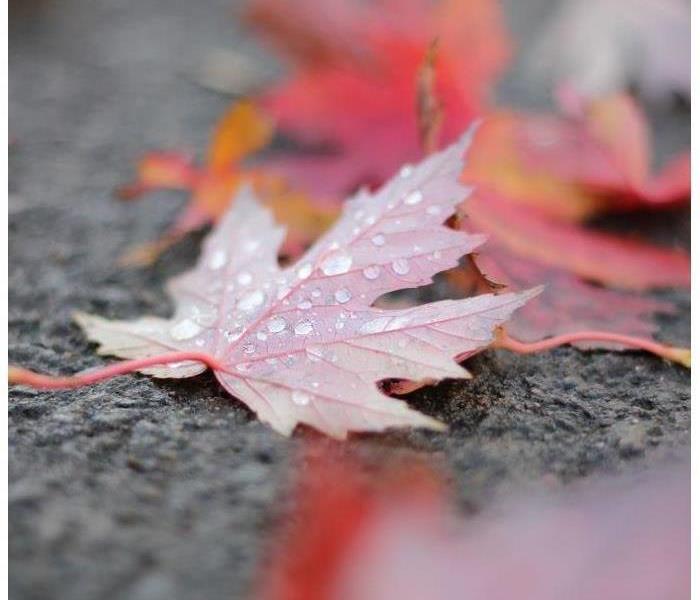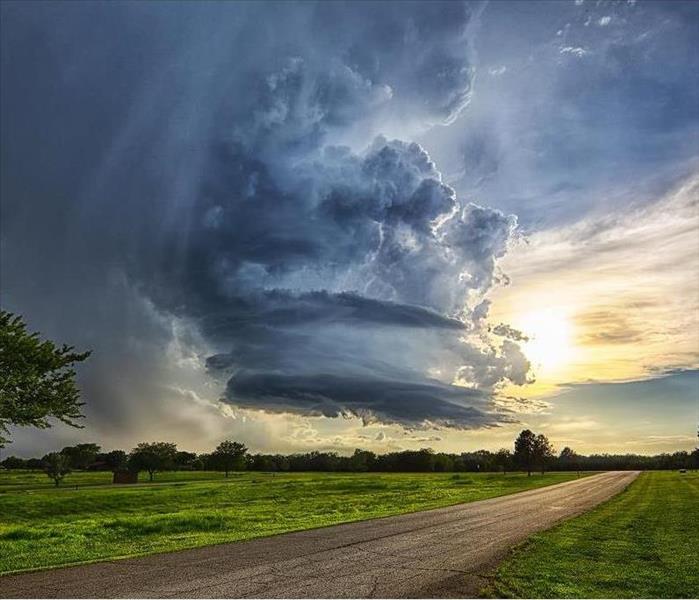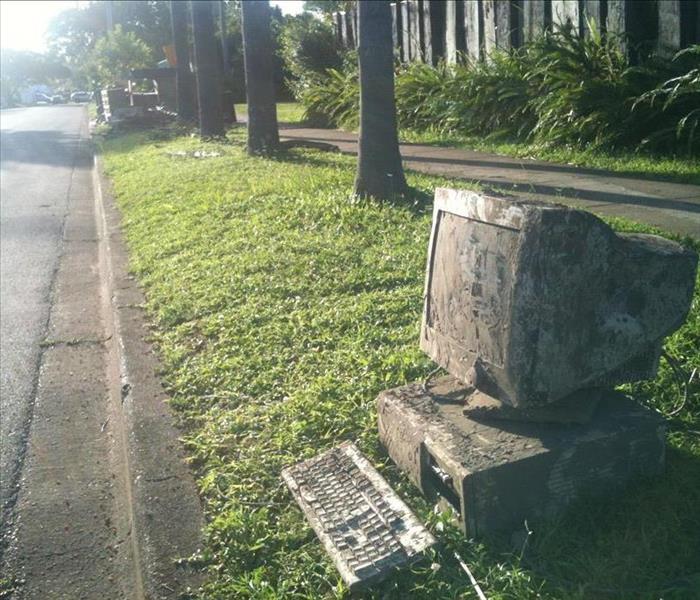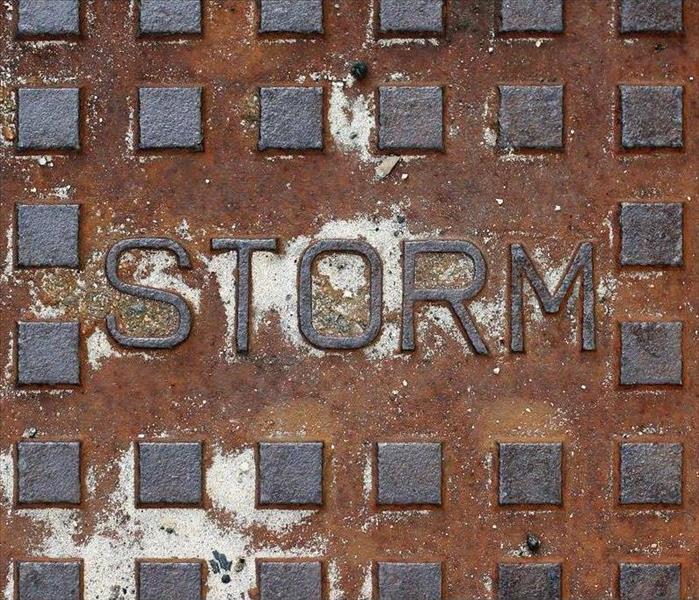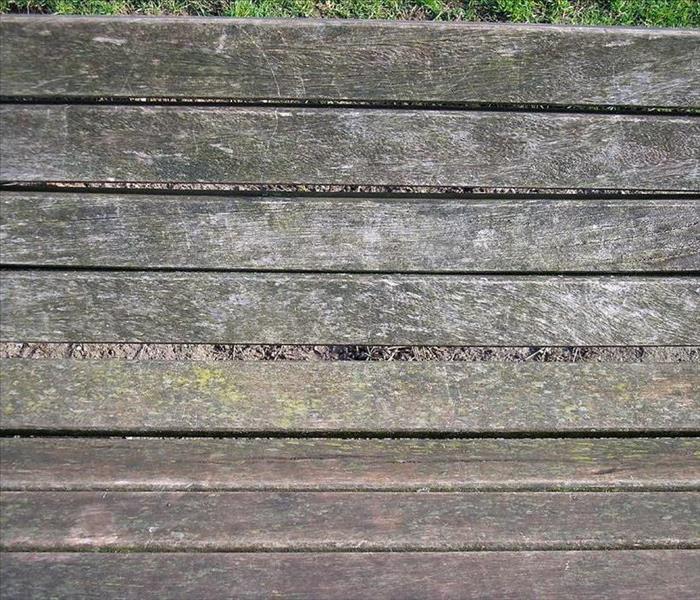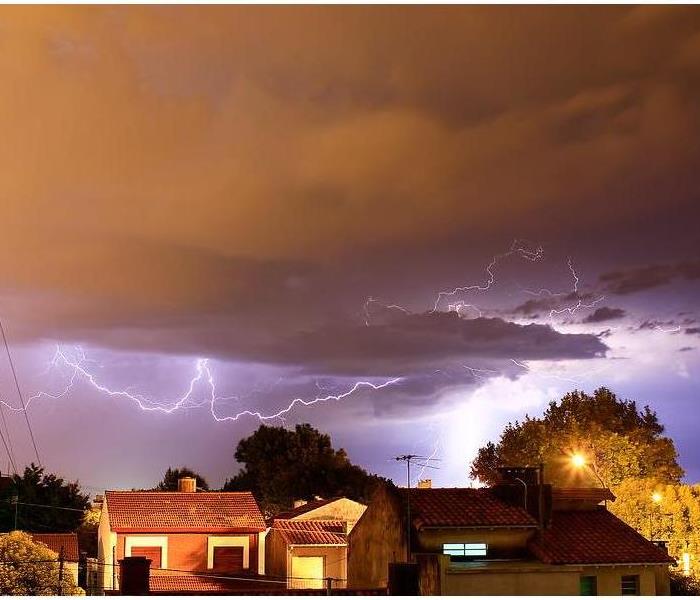Recent Storm Damage Posts
How to Prepare for and Recover from a Severe Storm
8/20/2024 (Permalink)
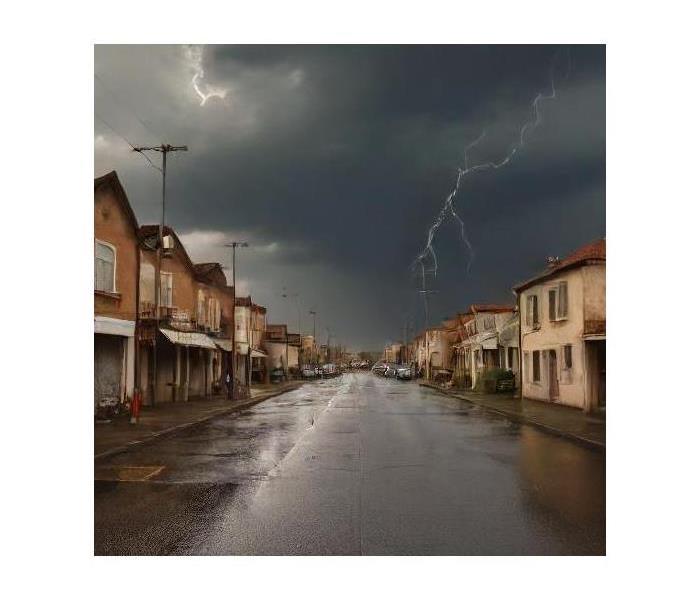 Keep your eyes on stormy skies and keep your indoors dry!
Keep your eyes on stormy skies and keep your indoors dry!
Severe storms can be both frightening and destructive, causing widespread damage and disruption. Whether you’re facing a hurricane, tornado, or severe thunderstorm, knowing how to prepare and respond can make a significant difference. Here’s a comprehensive guide on how to prepare for and recover from a severe storm, helping you stay safe and minimize damage.
Preparing for a Severe Storm
Emergency Kit: Assemble an emergency kit with essential supplies, including non-perishable food, water, medications, a flashlight, batteries, a first aid kit, and important documents. This kit should last at least 72 hours to cover the period when utilities and services might be disrupted.
Home Inspection: Ensure your home is storm-ready by checking for and reinforcing potential vulnerabilities. Secure windows and doors with storm shutters or plywood, and clear gutters and downspouts to prevent water damage.
Communication Plan: Establish a family communication plan, including emergency contact information and meeting points. Ensure all family members know what to do in case of evacuation and how to stay informed through weather alerts and news updates.
Insurance Review: Review your homeowner’s insurance policy to ensure you have adequate coverage for storm damage. Understand the terms of your policy, including coverage limits and deductibles, and make any necessary adjustments.
During the Storm
Seek Shelter: During severe storms, seek shelter in a safe location away from windows and exterior walls. For tornadoes, go to a basement or an interior room on the lowest floor. For hurricanes or severe thunderstorms, stay indoors and avoid using electrical appliances.
Stay Informed: Keep track of weather updates through a battery-powered radio or a weather app. Follow local authorities’ instructions and be prepared to adjust your plans based on the latest information. The Weather Channel offers real-time updates and alerts.
Avoid Flooded Areas: If you encounter floodwaters, avoid driving or walking through them. Just six inches of moving water can knock you off your feet, and it’s impossible to gauge the depth and speed of floodwaters accurately. For flood safety tips, visit the official Centers for Disease Control and Prevention (CDC) website.
Recovering from a Severe Storm
Safety First: Once the storm has passed, ensure it’s safe to leave your shelter. Avoid downed power lines, and check for structural damage before re-entering your home. Use a flashlight rather than candles to avoid fire hazards.
Document Damage: Take photos and videos of any damage to your property for insurance purposes. This documentation will be crucial for filing a claim and assessing the extent of the damage.
Clean Up: Begin clean-up efforts once it’s safe. Remove debris and contaminated items to prevent mold growth and further damage. Use a dehumidifier to dry out affected areas and consider hiring professional restoration services like SERVPRO of Washington County.
Seek Assistance: If needed, contact local disaster relief organizations or government agencies for assistance. They can provide resources and support for those affected by severe storms, including temporary housing, financial aid, and emergency services.
Being well-prepared and informed can make a significant difference when dealing with severe storms. By following these steps, you can protect yourself, your family, and your property, ensuring a more manageable recovery process after the storm has passed.
Safety Tips During and After a Flood
8/22/2023 (Permalink)
SAFETY FIRST (For businesses and home owners)
- Account that all employees or family members are safe by establishing evacuation plans in advance, identifying areas outside the building that are designated meeting places. Assign select individuals to keep a list of their assigned team’s names and contact numbers in order to account for their whereabouts.
- If water enters the building and evacuation becomes impossible, move to an upper floor, and wait for rescuers.
- While evacuating, avoid attempting to drive through floods or rising water, nearly half of all flash flood fatalities are auto-related.
- Do not touch electrical equipment if you are wet or standing in water.
- Do not walk through moving water. Even six inches of moving water can make you fall.
- Use no open flames (there may be gas escaping from ruptured mains).
- Avoid floodwaters. Water may be contaminated by oil, gasoline or raw sewage. Water may also be electrically charged. If the water has entered the structure through the flooding of a creek, stream or river, or if it has filtered through insulation during its intrusion, it is considered to be black water and could be hazardous to your health. Avoid contact with contaminated items as much as possible.
- Stay out of any building if it is surrounded by floodwaters.
- Listen for news reports to learn if the community’s water supply is safe to drink.
- Return only when authorities indicate it is safe.
SECURE THE PROPERTY
- Contact local emergency officials.
- Secure main entrances to building.
- Alert Security company and Alarm company of the situation.
STABILIZE THE PROPERTY
- Open basement or low-level windows to equalize water pressure on the building’s foundation and walls.
- Begin water damage mitigation steps only if local emergency officials deem the structure safe to enter.
- Notify your insurance agent or Risk Manager to determine insurance policy guidelines and steps to take.
Let's Talk about Sewage Water
9/27/2022 (Permalink)
It's definitely not the most pleasant problem to talk about, but sewage backups or leaks are very real and very serious issues you could face in your home or business.
Earlier we discussed how to tell if the water flooding in your property is clean or contaminated. It's probably the most important to know that sewage water should be assumed to be contaminated and hazardous at all times (until one of our professionals determines otherwise). Sewage water is typically referred to as category 3 black water. This classification is due to the dangerous contaminants in it. It's important to note that sewage water has the ability to appear clean. This is an instance of top water. If sewage runoff looks clean, it's usually because the waste and contaminants have sunk to the bottom. This water is still categorized as black water; not for the color, but for the risk it carries with it. In most cases of any standing water in your home, it's crucial to understand that just because you can't particularly see the contaminants or just because the water looks clear...doesn't mean that it is safe to try to mitigate yourself.
Our SERVPRO of Washington County crews are specifically trained to deal with hazardous water and how to clean any harmful remnants once the water is drained. Without that training, your knowledge is your most powerful tool to keep you from putting yourself at risk upon spotting standing water in your residential or commercial property.
If you experience sewage backup or sewage related flooding, let us be your first call. We make it, "Like it never even happened."
SERVPRO of Washington County
Flooding is Always a Risk
9/15/2022 (Permalink)
Unfortunately, just because you don't reside in a flood zone doesn't means that you won't get flooding.
Even the driest areas can experience what are known as flash floods. Rivers, streams, and lakes are almost always overflowing their banks, given a couple of rainy days. New construction in your neighborhood can even change runoff patterns in the area and can increase our flood risks.
The cost of flood damage is expensive. This cost can vary depending on the type of damage and where the water came from. Any tips that can help prevent this has to be worth the time to try them. You can't stop a flood from damaging your home from the above situations but you can do some things to keep a flood from happening inside your home.
Here are some things to try:
• An inspection and flushing your water heater once a year, by a plumber, can contribute to preventing it bursting on you and flooding the area.
• Replacing the rubber hoses on all appliances that use water with metal braided ones can help to avoid the failing of the rubber ones as they can get hard and burst. Check all hoses; even the metal braided ones every year.
• Leaks from toilets are often indicated by a little leakage from the base.
• Do you know where to locate the main water shut-off? If a pipe burst, inside, you need to be able to get it turned off quickly.
• If you have a sump pump, now is a good time to get it checked and think about a backup unit.
• Always be looking for signs of plumbing leaks, such as on ceilings and walls; you are looking for stains and moisture on those walls and floors.
• Leaking or even broken pipes are often gushing water, and it is not noticed because it might be hidden. Check out your water usage when no faucets are turned on; locate the water meter and take a reading, then use no water for an hour or so and read it again. Has it moved? If so, you have a leak someplace, so get a plumber to check it out.
• Always monitor your monthly water bill. If it goes up a lot one billing cycle, you might have the need for a plumber to come in and check all connections.
• Since a lot of water comes from inside your home and can damage many walls, floors, furniture and provide the moisture needed for molds to grow, doing whatever can be done to prevent leaks is a good exercise to undertake.
Fall is Preparation Time
9/15/2022 (Permalink)
Fall is a great time to prep your home for the winter storms ahead.
When you have rain, winds or snow that hits hard, property damage can be great.
Storm damage rarely only affects one home in the neighborhood so you really need to know who to call and why. SERVPRO of Washington County is there for you. We have crews that can guide you through your whole event. You may have trees down that need removing, roof repair, water damage and rebuilding maybe needed.
SERVPRO of Washington County can help you get the service you need for every step of your disaster. SERVPRO even has storm teams ready to come help the local franchises when a local disaster affects the area.
Prep time is great, making sure windows are sealed, branches cut back, things buttoned down as best you can but sometimes just having the right company to call can be some of the best prepping you can do.
Let's Get Storm Smart
1/31/2022 (Permalink)
Disaster can strike any time anywhere. If a major storm struck within the next 15 minutes, would you be prepared? Read on.
Approximately 98% of all presidentially declared disasters are related to weather events. These events can lead to about 500 deaths and cause nearly $15 billion in damages, according to the NOAA.
So, how do you make sure you're as ready as possible when severe weather hits? Know your risk and take action.
No matter how high or low your risk level is for severe weather, it's crucial to have an emergency plan and supply kit in place, just in case.
What do you include in your emergency supply kit?
It's important to mix and match these items to suit your specific personal needs, but here are some fundamentals to include:
- Water (1 gallon per person per day)
- Food (non-perishable 3-day supply)
- Manual can opener
- Battery operated radio, preferably and NOAA Weather Radio
- Flashlight and extra batteries
- First aid kit
- Whistle to signal for help, if need be
- Clothing
- Dust masks or bandanas
- Plastic sheeting, garbage bags and duct tape
- Wrench or pliers to turn off utilities, especially during flood or lightning risks
- Hygiene items
- Important documents; copies of insurance policies, identification and bank account info
- Cash
- Fire extinguisher
- Matches in a waterproof container
While this list is suitable for a home or business, if your business needs assistance devising an emergency plan, let us do it for you. We specialize in Emergency Ready Profiles which her minimize damage and business interruption in case of an emergency.
In any event, we are here to help you recover your home or business after any type of loss or damage.
We Care About You!
1/10/2022 (Permalink)
Storms can do some real damage to our home. Walls can come down, roofs come off and water come inside. We know this can be fixed for sure but what about our special items. Our "stuff" as we fondly refer to the things inside.
SERVPRO of Washington County can do so many things to save your items.
Your Paper Stuff.
When your valuable documents, including photographs, are damaged by water, extreme caution should be taken to help ensure the water damage does not destroy the document. Although some documents may not be restored to pre-water damage condition, SERVPRO Franchise Professionals can save a great deal and help minimize the loss.
Depending on the type of documents and the level of water damage, they have five options for the restoration of documents:
- Air Drying
- Dehumidification
- Freezer Drying
- Vacuum Freeze Drying
- Vacuum Thermal Drying
Your Electronic Stuff
Water-damaged electronics can present a serious hazard. Do not attempt to turn on or operate any electrical device that you suspect has been damaged by water. They will coordinate the restoration of your electronics, including:
- Television sets
- DVD players
- Computers
- And more
The key to restoring electronics is taking prompt action to prevent further damage. They start by cleaning the exterior of electronic devices to help stop further corrosion and damage. Electronics will be cleaned and inspected by a qualified electronics technician.
Those are just two categories of "stuff" that SERVPRO can help to restore after a loss.
SERVPRO of Washington County is here to help with all your items that are are sometimes more important to you than your roof that can be replaced.
Hazardous Sewage Water
10/13/2021 (Permalink)
It's certainly not a pleasant topic to discuss...but sewage backups or leaks are very real and very serious issues you could face in your home or business.
Earlier in April we discussed how to tell if the water flooding in your property is clean or contaminated. It's probably the most important to know that sewage water should be assumed to be contaminated and hazardous at all times (until one of our SERVPRO IIRC trained professionals determines otherwise).
Sewage water is typically referred to as category 3 black water. This classification is due to the dangerous contaminants in it. It's important to note that sewage water has the ability to appear clean. This is an instance of top water. If sewage runoff looks clean, it's usually because the waste and contaminants have sunk to the bottom. This water is still categorized as black water; not for the color, but for the risk it carries with it. In most cases of any standing water in your home, it's crucial to understand that just because you can't particularly see the contaminants or just because the water looks clear... doesn't mean that it is safe to try to mitigate yourself.
Our SERVPRO of Washington County crews are specifically trained to deal with hazardous water and how to clean any harmful remnants once the water is drained. Without that training, your knowledge is your most powerful tool to keep from putting yourself at risk upon spotting standing water in your residential or commercial property.
If you experience a sewage backup or sewage related flooding, etc., let us be your first call. We make it "Like it never even happened."
SERVPRO of Washington County
(301) 797-0677
Boarding Up!
9/22/2021 (Permalink)
You always see photos of homes and businesses boarding up before or after some kind of damaging event...but do you know why?
In the case of abandoned buildings, boarded up windows and doors are usually a measure to keep vandals or squatters out of the structure. However, in the event of damage or a loss, this process is to protect not only windows and doors from shattering, breaking, or failing in other ways, but to protect the structure itself.
Our professionally trained crews often times board up your home or business before or during mitigation and remediation to prevent any further damage.
If done incorrectly, the boarding up process could actually cause secondary damages such as additional moisture or even animal intrusion.
Whether it's fire, storm, or another kind of structural damage, boarding up can be just as dangerous as it is important. Especially if the damage or loss has already occurred.
The most common reasons to board up your home or business are severe rainstorms, flash flooding, severe thunderstorms, hailstorms, and of course, tornadoes.
While SERVPRO of Washington County is known to mitigate and remediate fire and water damage, don't forget that we are trained to deal with storm damage as well. Whether it's a tree on your roof, or a flooded basement, we are here to help!
Especially with our rebuild division emerging, SERVPRO of Washington County should be your first call when it comes to recovering and rebuilding after a major storm event. We make it, "Like it never even happened."
Also be sure to keep up with us on all social media because we will tweet or post to Facebook when our area is at risk for potential storm damage.
Storms in the Summer
9/17/2021 (Permalink)
It's dry, hot conditions outside. Who is thinking about flooding? Not many people.
The fact is that flooding can happen at anytime of the year. After long periods of dry weather, the ground can become hard and not able to absorb water from heavy rain fall.
Try to educate yourself about flood conditions before they happen.
Do you know the difference between a "flood watch" and "flood warning"? A "flood watch" means that a flood is possible in your area. A "flood warning "means flooding is already occurring or will occur soon. You should be prepared to evacuate at a moments notice if needed with a warning.
If there is a flood warning in your area, the smart thing to do is to evacuate and move to higher ground. Stay there until you know it's safe to return.
Don't try to walk through moving water. Even just 6" of water can make you fall down and only 12" can float most cars.
Keep yourself informed and safe when there is a chance of flooding. Remember it can happen anytime of the year.
Who You Gonna Call?
9/16/2021 (Permalink)
Remember the movie Ghost Buster? Remember the catch the phrase from the theme song....Who you gonna call? When a large storm affects your home or business, one of the first questions you might ask is, "Who am I gonna call?"
Well, that question is easy to answer. SERVPRO of Washington County at (301) 797-0677! You may want to first know the answer to "why" as well.
That answer is easy. SERVPRO is faster to any disaster. Getting to a loss quickly is key in reducing the secondary damage and restoration cost. Emergencies do not always happen during regular hours; which SERVPRO understands .This is why we are available 24/7/365. We are always ready to help.
Another reason to call is because SERVPRO is a leader in storm and water damage restoration, SERVPRO has the specialized training and expertise to restore your home back to its pre-storm condition. Our restoration process puts an emphasis on scientific drying techniques, progress monitoring and documentation.
SERVPRO of Washington County is locally owned. We are party of your community and will be there whenever you need us.
So do you know your answer when you ask yourself, "Who you gonna call?" The answer should be SERVPRO of Washington County!
(301) 797-0677
The Taboo Subject of Storms
2/4/2021 (Permalink)
It's definitely not the most pleasant problem to talk about, but sewage backups or leaks are very real and very serious issues you could face in your home or business.
Earlier we discussed how to tell if the water flooding in your property is clean or contaminated It's probably the most important to know that sewage water should be assumed to be contaminated and hazardous at all times (until one of our professionals determines otherwise). Sewage water is typically referred to as category 3 black water. This classification is due to the dangerous contaminants in it. It's important to note that sewage water has the ability to appear clean. This is an instance of top water. If sewage runoff looks clean, it's usually because the waste and contaminants have sunk to the bottom. This water is still categorized as black water; not for the color, but for the risk it carries with it. In most cases of any standing water in your home, it's crucial to understand that just because you can't particularly see the contaminants or just because the water looks clear...doesn't mean that it is safe to try to mitigate yourself.
Our SERVPRO of Washington County crews are specifically trained to deal with hazardous water and how to clean any harmful remnants once the water is drained. Without that training, your knowledge is your most powerful tool to keep you from putting yourself at risk upon spotting standing water in your residential or commercial property.
If you experience sewage backup or sewage related flooding, let us be your first call. We make it, "Like it never even happened."
Flooding in YOUR Home
1/12/2021 (Permalink)
Don't think just because you don't reside in a flood means that you won't get flooding.
Even the driest areas can experience what are known as flash floods. Rivers, streams, and lakes are almost always overflowing their banks, given a couple of rainy days.
New construction in your neighborhood can even change runoff patterns in the area and can increase our flood risks.
The cost of flood damage is expensive. This cost can vary depending on the type of damage and where the water came from. Any tips that can help prevent this has to be worth the time to try them. You can't stop a flood from damaging your home from the above situations but you can do some things to keep a flood from happening inside your home.
Here are some things to try:
• An inspection and flushing your water heater once a year, by a plumber, can contribute to preventing it bursting on you and flooding the area.
• Replacing the rubber hoses on all appliances that use water with metal braided ones can help to avoid the failing of the rubber ones as they can get hard and burst. Check all hoses; even the metal braided ones every year.
• Leaks from toilets are often indicated by a little leakage from the base.
• Do you know where to locate the main water shut-off? If a pipe burst, inside, you need to be able to get it turned off quickly.
• If you have a sump pump, now is a good time to get it checked and think about a backup unit.
• Always be looking for signs of plumbing leaks, such as on ceilings and walls; you are looking for stains and moisture on those walls and floors.
• Leaking or even broken pipes are often gushing water, and it is not noticed because it might be hidden. Check out your water usage when no faucets are turned on; locate the water meter and take a reading, then use no water for an hour or so and read it again. Has it moved? If so, you have a leak someplace, so get a plumber to check it out.
• Always monitor your monthly water bill. If it goes up a lot one billing cycle, you might have the need for a plumber to come in and check all connections.
• Since a lot of water comes from inside your home and can damage many walls, floors, furniture and provide the moisture needed for molds to grow, doing whatever can be done to prevent leaks is a good exercise to undertake.
Boarding Up!
10/14/2020 (Permalink)
You always see photos of homes and businesses boarding up before or after some kind of damaging event, but do you know why?
In the case of abandoned buildings, boarded up windows and doors are usually a measure to keep vandals or squatters out of the structure. However, in the event of damage or a loss, this process is to protect not only windows and doors from shattering, breaking, or failing in other ways, but to protect the structure itself.
Our professionally trained crews often times board up your home or business before or during mitigation and remediation to prevent any further damage.
If done incorrectly, the boarding up process could actually cause secondary damages such as additional moisture or even animal intrusion.
Whether it's fire, storm, or another kind of structural damage, boarding up can be just as dangerous as it is important. Especially if the damage or loss has already occurred.
The most common reasons to board up your home or business are severe rainstorms, flash flooding, severe thunderstorms, hailstorms, and of course, tornadoes.
While SERVPRO of Washington County is known to mitigate and remediate fire and water damage, don't forget that our teams are trained to deal with storm damage as well. Whether it's a tree on your roof, or a flooded basement, we are here to help!
With our incredible rebuild division, SERVPRO of Washington County should be your first call when it comes to recovering and rebuilding after a major storm event. We make it, "Like it never even happened."
Also be sure to keep up with us on all social media because we will tweet or post to Facebook or Instagram when our area is at risk for potential storm damage.
Staying Above Water
9/23/2020 (Permalink)
What is the most common and widespread natural disaster in the United States? If you answered floods, then you are well on your way to staying above water!
Floodsmart.gov reports that in the last 5 years, all 50 states have experienced floods or flash floods. According to the American Red Cross, floods cause more damage in the U.S. every year than any other weather related disaster.
If you get stuck in a flooding situation be sure to stay away from flood waters. A mere six inches of swiftly moving water can sweep you off your feet. If you're driving, turn around and don't drown! Most cars can get swept away by less than two feet of moving water. If waters are rapidly rising whilst you're driving on a flooded road, get out of your car and move yourself to higher ground. Value your safety first! Also be sure to keep children out and away from any flooding water zones.
Whether your home or business is near a coastline, in the city, the mountains, near a tiny river, or even in the desert...there is always potential for flood damage. Never having experienced a flood or flood damage does not mean you never will! 20% of flood insurance claims come from moderate to low risk area. On average, flooding costs $3.5 billion in annual losses for the USA.
Even minor floods have the potential to cause major damage to a structure when it isn't treated quickly and properly. The cleanup can be overwhelming, but that is what SERVPRO of Washington County is here for. Our crews are trained to handle an size disaster. When you feel like you're drowning in water damage, SERVPRO helps you stay above water!
Flash Flood Warning vs Watch
9/17/2020 (Permalink)
We've definitely seen our fair share of summer storms so far this season, and plenty of those have come with a good bit of flash flood warnings and watches! Since SERVPRO of Washington County is one of the most reliable sources in the community for storm and water damage remediation, we figured it's only fair we provide you some flash flood facts. Knowing the difference between and warning and a watch could be the difference between being prepared and being at risk for flood damage.
Flood warnings:
When your local agencies (whether it be NWS or a local weather station) issue a flash flood/flood warning this means flooding is happening or will happen soon. When you see this warning, it means you should move to high ground or be prepared for flooding ASAP. Often times it is important to be aware of any announcements from local officials if the flooding is projected to be particularly severe.
Flood watches:
When local agencies issue a flash flood/flood watch, it means that flooding is possible. Upon the release of this watch, you should be sure to stay tuned to radio or TV for more information about the potential severity of the flood, should the watch be converted into a warning.
We know this can seem confusing, but if you're connected with us on Facebook or Twitter, we are sure to clarify what and when each watch/warning means, when we can.
Maryland's Unpredictable Storms
9/14/2020 (Permalink)
Maryland blue crabs, black-eyed Susans, great blue herrings – Maryland is such a lovely state for so many reasons. One of the greatest things about our great state is that we get to experience the perfect amount of all four seasons. However, Maryland does come with its disadvantages as well. With a wide range of weather also comes completely unpredictable weather. How many other states can go from snowy to shorts and t-shirt temperatures overnight?
With all these crazy weather swings, Maryland experiences a lot of storms, especially in the summer! This summer, we have been riddled with storms. Many storm-lovers have been on cloud 9 as the beautiful clouds roll in and the thunder booms, but many other Maryland residents have unfortunately endured flooding, wind damage, and all sorts of other disasters to their spaces.
Storms have their ups and downs, but just know that even if you experience a major issue in your home or business, SERVPRO of Washington County will be there to help – rain or shine! We are faster to any size disaster!



 24/7 Emergency Service
24/7 Emergency Service

